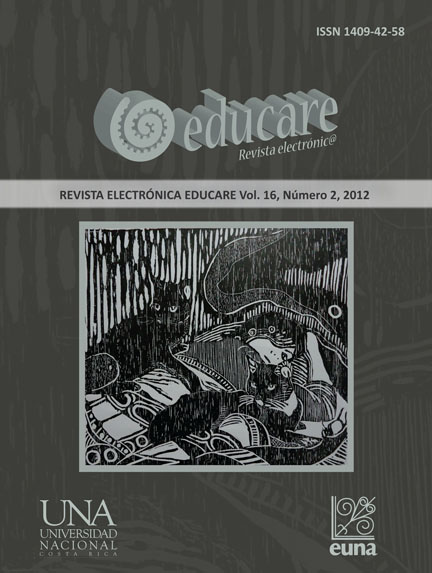“Constructive Paranoia” Applied to Education (The Case of English Language Teaching)
DOI:
https://doi.org/10.15359/ree.16-2.8Keywords:
English Language Teaching, Constructive Paranoia, English for specific purposes (ESP), Education, Latin America.Abstract
This paper analyzes the concept of constructive paranoia stated by journalist and author Andrés Oppenheimer to promote development in Latin America. Based on that concept, this paper discusses the effectiveness of current English Language Teaching, particularly, as well as what should be done in order to obtain better results. As a conclusion, a re-structure of approach, curriculum and methodology in teaching the language is proposed.
References
Ávila, R. (21 de febrero de 2011). Nos falta la ‘paranoia constructiva’, dice el periodista Andrés
Oppenheimer. Portafolio. Recuperado de http://www.insutec.edu.co/index_htm_files/
paranoia_constructiva.pdf
Brunner, J. J. (diciembre, 2008). Educación superior y mundo del trabajo: Horizontes de
indagación. Calidad en la educación, 29, 230-240. Recuperado de http://mt.educarchile.cl/
mt/jjbrunner/archives/cse_articulo753.pdf
Douglas, D. (2000). Assessing Languages for Specific Purposes [Evaluación de idiomas para
propósitos específicos]. New York: Cambridge University Press.
Estado de la Educación. (2010). Tercer Informe del Estado de la Educación, Informe final. Extensión
y dominio del inglés como segunda lengua en el sistema educativo costarricense: Situación
actual, problemas y desafíos. San José, Costa Rica: CONARE. Recuperado de http://
www.estadonacion.or.cr/images/stories/informes/educacion_003/docs/ponencias/
Barahona_2010_Dominio_Ingles.pdf
Feller, R. (septiembre, 2011). Advancing the STEM Workforce Through STEM-Centric Career
Development [Proción de la fuerza laboral STEM]. Technology and Engineering Teacher,
(1), 6-12.
Harding, K. (2005). English for Specific Purposes [Inglés para propósitos específicos]. Oxford:
Oxford University Press.
Krashen, S. D. (1987). Principles and Practice in Second Language Acquisition [Principios y práctica en
la adquisición de una segunda lengua]. Inglaterra: Prentice-Hall International.
Maxwell-Reid, C. (Diciembre, 2010). Content and Language Integrated Learning (CLIL): The
Influence of Studying Through English on Spanish students’ first Language written
Discourse [Aprendizaje integrado de contenido y lenguaje (CLIL) La influencia de estudiar
en inglés en el discurso escrito en estudiantes de lengua materna en español]. Text and
Talk, 30(6), 679-699. doi: 10.1515/TEXT.2010.033
Narváez, A. (2010). Educación, capitalismo y desarrollo. Cultura alfabética y globalización
anglosajona. Signo y pensamiento, 29(57), 248-267.
Nunan, David. (1998). The Learner-Centred Curriculum [El currículo centrado en el estudiante].
Cambridge: Cambridge University Press.
Oppenheimer, A. (2010). ¡Basta de historias! La obsesión latinoamericana con el pasado y las 12
claves del futuro. Buenos Aires: Editorial Debate
Oppenheimer, A. (2006). Cuentos chinos. El engaño de Washington, la mentira populista y la
esperanza de América Latina. Buenos Aires: Editorial Sudamericana.
Richards, J. C. y Nunan, D. (Ed.). (1990). Second Language Teacher Education [Educación del profesor
de segundas lenguas]. Cambridge: Cambridge Language Teaching Library.
Schumann, J. H. (1978). The Acculturation Model for Second Language Acquisition [El modelo de
la aculturación para la adquisición de una segunda lengua]. En R. C. Gingras (Ed.), SecondLanguage
Acquisition and Foreign Language Teaching [Adquisición de una segunda lengua
y enseñanza de lenguas extranjeras] (pp. 27-50). Arlington, Virginia: Center for Applied
Linguistics.
Tudor, I. (2001). The Dynamics of the Language Classroom [La dinámica de la clase de idiomas].
Cambridge University Press.
Vega, W. (25 de noviembre de 2010). ‘Es hora de reconocer lo mal que estamos’: Andrés
Oppenheimer. El Tiempo. Recuperado de http://www.andresoppenheimer.com/2011/06/08/
es-hora-de-reconocer-lo-mal-que-estamos-andres-oppenheimer/
Vegas, L. (01 de mayo de 2011. Andrés Oppenheimer. Periodista y escritor argentino: “Nos
falta paranoia constructive”. El Deber. Recuperado de http://www.eldeber.com.bo/nota.
php?id=110430182801
Downloads
Published
How to Cite
Issue
Section
License
1. In case the submitted paper is accepted for publication, the author(s) FREELY, COSTLESS, EXCLUSIVELY AND FOR AN INDEFINITE TERM transfer copyrights and patrimonial rights to Universidad Nacional (UNA, Costa Rica). For more details check the Originality Statement and Copyright Transfer Agreement
2. REUTILIZATION RIGHTS: UNA authorizes authors to use, for any purpose (among them selfarchiving or autoarchiving) and to publish in the Internet in any electronic site, the paper´'s final version, both approved and published (post print), as long as it is done with a non commercial purpose, does not generate derivates without previous consentment and recognizes both publisher's name and authorship.
3. The submission and possible publication of the paper in the Educare Electronic Journal is ruled by the Journal’s editorial policies, the institutional rules of Universidad Nacional and the laws of the Republic of Costa Rica. Additionally, any possible difference of opinion or future dispute shall be settled in accordance with the mechanisms of Alternative Dispute Resolution and the Costa Rican Jurisdiction.
4. In all cases, it is understood that the opinions issued are those of the authors and do not necessarily reflect the position and opinion of Educare, CIDE or Universidad Nacional, Costa Rica. It is also understood that, in the exercise of academic freedom, the authors have carried out a rogorous scientific-academic process of research, reflection and argumentation thar lays within the thematic scope of interest of the Journal.
5. The papers published by Educare Electronic Journal use a Creative Commons License:














 The articles published by Educare Electronic Journal can be shared with a Creative Commons License:
The articles published by Educare Electronic Journal can be shared with a Creative Commons License: 



